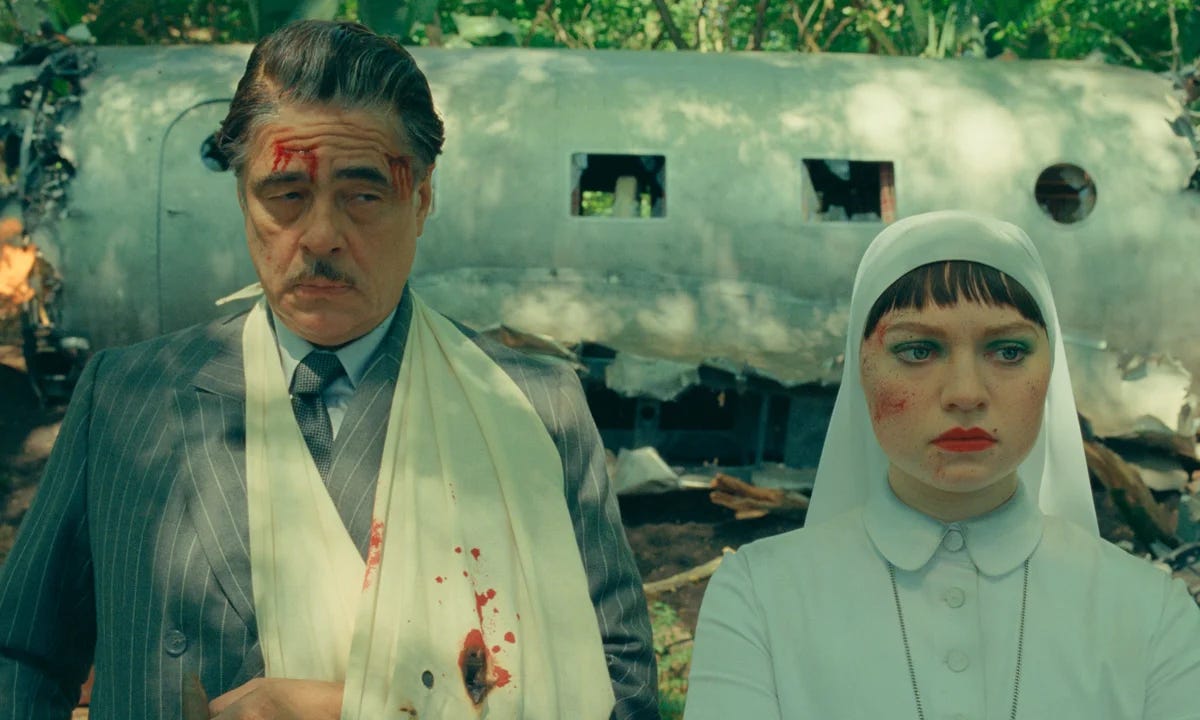I don’t know anyone who’s ambivalent towards Wes Anderson. I have two close friends whose opinions I value deeply and who couldn’t be more opposed in their views on the subject of the 21st century’s most distinctive director. If you are simply lukewarm on Anderson and rarely give him a second thought, let me know in the comments. Of course, I never read the comments.
To get ahead of it, I’ll say that The Phoenician Scheme is an improvement upon Anderson’s most recent and largely most disappointing projects, Asteroid City and The French Dispatch. How The Phoenician Scheme succeeds when others have failed can be boiled down to the fact that the movie has more of a story than we’ve seen from Anderson in a long time. After exercising some of his personal demons and anxieties about the purpose of art and his confusion as an artist at his relative peak in Asteroid City, he returns to his roots: daddy issues.
However, Benicio del Toro plays a worthy daddy to have issues over, pardon the expression. He’s no Gene Hackman, but Royal Tenenbaum was a once-in-a-generation part, and I’m not sure if Anderson has it in him to write such a family drama again. He’s joined by Mia Threapleton as Liesl, the estranged daughter of del Toro’s Zsa Zsa, who is suddenly summoned to the grand estate to collect the keys to the kingdom. There have been a lot of stories lately about children’s inability to soften or change their parents, so it was nice to see one that admits this is possible.
Side note: I’m glad I didn’t know Threapleton is Kate Winslet’s daughter until after my viewing experience, as this would’ve instantly soured me toward her. I’m a snob that way.
Unfortunately, I do feel that one of the problems with coming as far as Anderson has as a director is that the actors tend to curb their personal interpretations of characters in favor of what they think he wants. It’s easy to imagine that as soon as you’re tapped to play any part in Anderson’s work, you willingly begin to practice delivering monotone speeches and moving like a statue. This has regularly been true and is an important part of his style, as it lets the comedy and dialogue speak for themselves, but it’s gotten more extreme with time, as with most of his stylistic choices.
As always, I liked looking at every carefully crafted frame and felt myself pulled into Anderson’s version of the world. Though I go into all his movies on the defense, unsure if I want to be swept away, I go along anyway, and that’s probably what I like best about his sensibilities. They’re intense yet gentle, taking me to corners of the universe I could never dream up on my own. Fans of Anderson will be pleasantly diverted and enjoy his painstaking and obvious love of the craft that has kept cinephiles on his side for so many years.
Anderson’s interest in the ultra-rich is one that everyone living under capitalism shares. I was really going to try not to mention capitalism in this one, but the movie is about a corrupt, mad billionaire exploiting laborers in a country that isn’t his... But, as Zsa Zsa says, he has no country. Maybe this is how Anderson feels, and maybe he’s also looking for an heir-apparent to come along and show him the true meaning of life. Not God, though Bill Murray cuts an interesting figure as the big guy, but a sincerity of faith, in whatever form that takes.
I’m hesitant to attribute too much meaning to any of Anderson’s work.
I’m hesitant to attribute too much meaning to any of Anderson’s work. In The Phoenician Scheme, I wasn’t moved or floored by a particular moment. While Asteroid City was a bit of a mess, it boasts a significant emotional throughline. The exchange between Jason Schwartzman and Margot Robbie, when they met on the fire escapes, will stay with me for what could conceivably be forever. The Phoenician Scheme doesn’t have a scene like this. There are a few too many conflicting themes in the project that never reach their apex, failing to hit home fully.
Anderson convinced us a long time ago that he has a nuanced understanding of what it's like to exist within a family in conflict. He knows that to have a family is to be in conflict and in eternal competition, as well as near-constantly feeling like you're on the verge of being truly understood. In The Phoenician Scheme, I don't know if Zsa Zsa fully believes in or understands Liesl's God and her faith. But it's in his act of trying that I can start to see him redeemed. Lucky for us all, it won't be Anderson or me standing at the pearly gates when our times come.
Coming out as someone who despises giving star ratings, but needs must:
3ish/5




